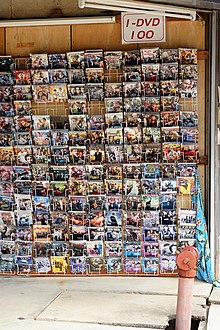Copyright infringement
![]()
This article or paragraph presents the situation in Germany. Help describe the situation in other countries.
Copyright infringement is a violation of copyright laws.
This usually refers to an infringement of the exploitation rights defined in the German Copyright Act or the appropriation of another's work under one's own name (plagiarism). A frequent infringement consists of an illegally produced or distributed copy of copyrighted - mostly electronic - media. These copies are often called pirated copies in reference to the centuries-old term pirated print. In addition, there is the colloquial term black copy, which refers to an illegal copy in violation of copyright law. The media can be films, pieces of music, books, computer programs, databases or other material protected by copyright. This does not involve payment to the author or rights holder, which is usually required when buying a legal copy.
Other copyright infringements may lie, for example, in the modification of a work or its title. Unauthorized adaptation or rearrangement of a work is also a copyright infringement.
Historically, copyright infringement is a relatively recent phenomenon, as copyright law only achieved the protection it has today in the 20th century. Before that, for example, the copying or reprinting of books, the adoption of songs by a singer by the general public or other musicians, the fleshing out of a narrative material by various authors in different directions were relatively normal processes that were tolerated to a certain extent. A property right existed in principle only in the material carriers - e.g. in a book as an object - not in the contents. However, there had long been the concept of plagiarism, which referred, for example, to the adoption of other people's texts and could be outlawed accordingly.
Due to new technologies, the economic consequences of illegal copying took on ever greater dimensions. Particularly worthy of mention is the easy copying of digital source material, which has been possible since the 1990s, even in the private sphere, and which allows 1-to-1 copying without any reduction in quality with little expenditure of time and material. At the same time, however, copyright infringements have become easier to prove in some cases.

A shop with black copies in Thailand
See also
- Bootleg
- Product piracy
- Warez
Questions and Answers
Q: What is copyright infringement?
A: Copyright infringement, also known as copyright violation, is when someone uses material that is protected by copyright law without the permission of the original copyright owner in a way that infringes on one of the copyright owner's exclusive rights, such as the right to make derivative works, reproduce, or perform the copyrighted material.
Q: What is the slang term used to describe illegally copied material?
A: The slang term used to describe illegally copied material is bootleg.
Q: What is the difference between piracy and copyright infringement?
A: Richard Stallman argues that people should not call copying and distribution "piracy" because piracy refers to attacking ships, killing and stealing people. However, some courts may still use the term "piracy" to describe copyright infringement, particularly in cases where large amounts of material are being sold without permission.
Q: Why do some people call illegally copying movies and music "piracy" or "theft"?
A: Some people use the terms piracy or theft to describe copyright infringement because they view it as a form of stealing intellectual property.
Q: What is the problem with using the term "theft" to describe copyright infringement?
A: Some courts have ruled that using the term theft to describe copyright infringement is not accurate because theft implies the taking of physical property rather than intellectual property.
Q: What does it mean when people use the word "piracy" to describe copyright infringement?
A: When people use the word "piracy" to describe copyright infringement, they are usually referring to the selling of many copies of copyrighted material without permission. However, sometimes the term "piracy" can refer to any significant infringement of copyright law.
Q: What are some of the exclusive rights of copyright owners that can be violated through copyright infringement?
A: Some of the exclusive rights of copyright owners that can be violated through copyright infringement include the right to reproduce, perform, and make derivative works based on the original copyrighted material.
Search within the encyclopedia